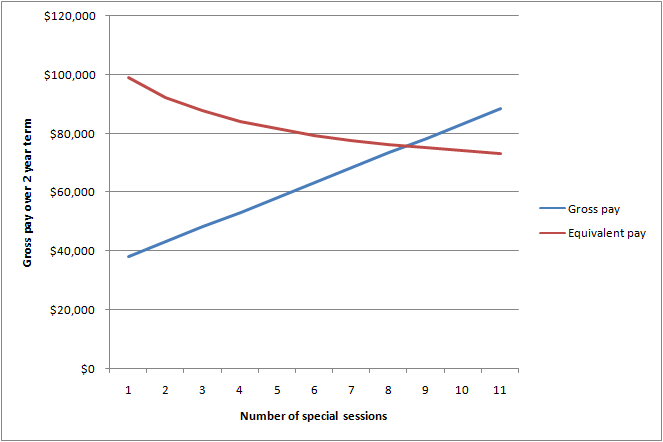The Texas citizen legislator is a partial myth: few ordinary citizens can afford to be a legislator, especially if they face a competitive race.
Evidence is both empirical and mathematical.
Empirical
99.3% of legislators are not ordinary citizens with ordinary employment. My skimming of biographical data and limited statistical sampling finds that all legislators except one are one or more of:
- Wealthy
- Have spouse with significant income
- Attorney, business owner, high ranking officer, or other career that benefits from prestige of being a legislator or has unusual employment flexibility
One exception: Armando Martinez of Weslaco is a firefighter and paramedic.
Source: House of Representatives Biographical Data and individual legislator biographies when the prior reference was not clear.
Mathematical
Why so few ordinary citizens? The math explains.
Prima facie evidence suggests legislators are well paid despite their $600 monthly salary. Include the $168 per diem for the 140 day regular session, and you get gross pay of $37,920 for the 2 year term. An annualized equivalent (divide by 140, multiply by 365) is $98,862. Not bad.
But the mathematics can skew:
Living expenses. The per diem‘s intent is for living expenses incurred while attending a legislative session. Fortunately, the Texas Ethics Commission allow campaign funds to cover these expense (source). This is critical: if all the per diem had to go to legislative-related living expenses, that would slash the salary to $14,400, or an annualized equivalent of $37,542. But you still must have a substantial campaign fund to pull this off. That takes a lot of work.
Special sessions. The complexity of issues facing the Legislature are challenging its part time status. For example, the 78 legislature (2003-2004) had four special sessions.
This skews the equivalent annual pay math. Additionally, each special session increases the number of days a legislator can’t work his regular career.
This chart illustrates the pay effect of special sessions, expressed in annualized salary:

Other events outside of session. Legislators may need to attend occasional committee meetings and other events outside the legislative session. I don’t know if the legislator gets per diem compensation for these, but their effect is to further dilute gross annualized pay similar to special sessions.
Campaigning. This is the killer. If you’re in a competitive district or have a tough nomination fight (or both!), you will probably dedicate a few months just to campaigning. That means you can’t work your “real job.”
I philosophically oppose public campaign financing, so I’m not calling for any official remuneration. Public financing allows too much state control over who can run for office, and raising private money is a good test of one’s support.
The Texas Ethics Commission could help by allowing campaign funds to cover wages and benefits lost while campaigning. Candidates shouldn’t starve, and COBRA is costly!
Without that, it looks like you have to rely on personal funds to compensate for lost wages and benefits.
Conclusion
I admit it: I’d love to be in the legislature. But it’s tough since I’m not in one of the privileged categories. However, it’s not impossible.
You ought to email this to Jerry Patterson, and get his take on it. I do not think he was rich.